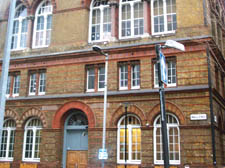| |

St Mungo's hostel |
'Covent Garden is important for the homeless'
A leading campaigner for London’s homeless community hit out at objectors to the reopening of a Covent Garden hostel.
Richard Burdett, editor of the Pavement, the magazine for homeless people, said critics were trying to force homeless people out of the area.
He backed St Mungo’s in Endell Street, as opposition from the local community gathered momentum.
Residents fear that when the doors open after a year-long refurbishment, it will spell a return to drug dealing and aggressive begging which they say plagued the area while the hostel was open.
Staff at St Mungo’s, which is now under new management, have moved to defuse tension, promising a radical turnaround and inviting the community to get involved with the running of the 52-bed hostel.
Mr Burdett said: “Homeless people are entitled to be in Covent Garden just like anyone else. With so-called undesirables, people are always going to want to hide them away on the fringes, which is a shame. Surely it’s better, if you have street drinkers and addicts to have them in well-lit and well-policed areas, rather than forced onto the fringe.
“The homeless should be in the open like anyone else. If they’re breaking the law arrest them, but otherwise they are entitled to be there and that counts for Covent Garden as well as anywhere else. I think people just think they’re a nuisance, but if the alternative is hiding them, we need new alternatives.”
“Covent Garden is an important area for the homeless. It has been since the days of Hogarth’s Gin Lane. To me the argument against St Mungo’s is nimbyism. I can understand that, but people have to ask themselves: What’s the alternative? We can’t get ourselves into a situation where we segregate the homeless into ghettoes. I support St Mungo’s defence, and hope the new manager can find a way around the objections.”
Edwin Hilliard, 47 a resident at the hostel, said St Mungo’s had turned his life around.
“It’s madness to say homeless people should not be in central London,” he said. “That would be apartheid. I think attitudes need to change because there are some amazing people in the hostel. I’ve met painters, poets, writers – but above all they are human beings and not criminals. People need to remember that.”
But residents are not convinced by the change in management, maintaining that Covent Garden is not an appropriate place for a homeless hostel.
Jo Weir, chairwoman of the Covent Garden Community Association said: “We are facing the reopening with strong apprehension. Since the hostel has closed Covent Garden has been a different place.
“We’ve really enjoyed the peace of it.
“They’ve assured us that things will change under new management but I’m not holding my breath.
“We feel it deeply inappropriate to have a homeless hostel where there is so much temptation. Around here they can make £100 begging in no time – and what are they going to spend it on? Heroin and crack. We don’t want to come across as unsympathetic – we agree these people need help – but central London is not the right place. Trying to rehabilitate 17-year-old homeless kids in the middle of London is madness.”
St Mungo’s has been in Covent Garden since 1983. When it reopens after a £3.2 million refit it will be one of the most modern hostels in the borough. |
 |
|
| |
| |